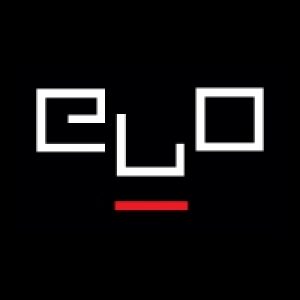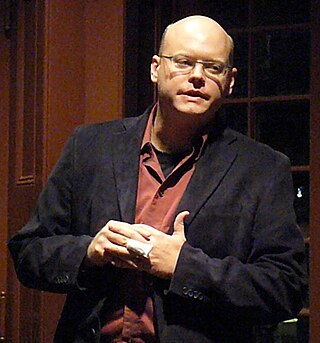Related Research Articles

Hypertext is text displayed on a computer display or other electronic devices with references (hyperlinks) to other text that the reader can immediately access. Hypertext documents are interconnected by hyperlinks, which are typically activated by a mouse click, keypress set, or screen touch. Apart from text, the term "hypertext" is also sometimes used to describe tables, images, and other presentational content formats with integrated hyperlinks. Hypertext is one of the key underlying concepts of the World Wide Web, where Web pages are often written in the Hypertext Markup Language (HTML). As implemented on the Web, hypertext enables the easy-to-use publication of information over the Internet.

Robert Lowell Coover is an American novelist, short story writer, and T.B. Stowell Professor Emeritus in Literary Arts at Brown University. He is generally considered a writer of fabulation and metafiction.
Unknown or The Unknown may refer to:
Hypertext fiction is a genre of electronic literature, characterized by the use of hypertext links that provide a new context for non-linearity in literature and reader interaction. The reader typically chooses links to move from one node of text to the next, and in this fashion arranges a story from a deeper pool of potential stories. Its spirit can also be seen in interactive fiction.

Postmodern literature is a form of literature that is characterized by the use of metafiction, unreliable narration, self-reflexivity, intertextuality, and which often thematizes both historical and political issues. This style of experimental literature emerged strongly in the United States in the 1960s through the writings of authors such as Kurt Vonnegut, Thomas Pynchon, William Gaddis, Philip K. Dick, Kathy Acker, and John Barth. Postmodernists often challenge authorities, which has been seen as a symptom of the fact that this style of literature first emerged in the context of political tendencies in the 1960s. This inspiration is, among other things, seen through how postmodern literature is highly self-reflexive about the political issues it speaks to.

Giles Goat-Boy (1966) is the fourth novel by American writer John Barth. It is a metafictional comic novel in which the universe is portrayed as a university campus in an elaborate allegory of both the hero's journey and the Cold War. Its title character is a human boy raised as a goat, who comes to believe he is the Grand Tutor, the predicted Messiah. The book was a surprise bestseller for the previously obscure Barth, and in the 1960s had a cult status. It marks Barth's leap into American postmodern fabulism.
Digital poetry is a form of electronic literature, displaying a wide range of approaches to poetry, with a prominent and crucial use of computers. Digital poetry can be available in form of CD-ROM, DVD, as installations in art galleries, in certain cases also recorded as digital video or films, as digital holograms, on the World Wide Web or Internet, and as mobile phone apps.
Electronic literature or digital literature is a genre of literature where digital capabilities such as interactivity, multimodality or algorithmic text generation are used aesthetically. Works of electronic literature are usually intended to be read on digital devices, such as computers, tablets, and mobile phones. They cannot be easily printed, or cannot be printed at all, because elements crucial to the work cannot be carried over onto a printed version.
Edward Falco is an American author, playwright, electronic literature writer, and new media editor.

afternoon, a story, spelled with a lowercase 'a', is a work of electronic literature written in 1987 by American author Michael Joyce. It was published by Eastgate Systems in 1990 and is known as one of the first works of hypertext fiction.
Web fiction is written works of literature available primarily or solely on the Internet. A common type of web fiction is the web serial. The term comes from old serial stories that were once published regularly in newspapers and magazines.

The Electronic Literature Organization (ELO) is a nonprofit organization "established in 1999 to promote and facilitate the writing, publishing, and reading of electronic literature". It hosts annual conferences, awards annual prizes for works of and criticism of electronic literature, hosts online events and has published a series of collections of electronic literature.

Jane Yellowlees Douglas is a pioneer author and scholar of hypertext fiction. She began writing about hypermedia in the late 1980s, very early in the development of the medium. Her 1993 fiction I Have Said Nothing, was one of the first published works of hypertext fiction.
Stuart Moulthrop is an innovator of electronic literature and hypertext fiction, both as a theoretician and as a writer. He is author of the hypertext fiction works Victory Garden (1992), which was on the front-page of the New York Times Book Review in 1993, Reagan Library (1999), and Hegirascope (1995), amongst many others. Moulthrop is currently a Professor of Digital Humanities in the Department of English, at the University of Wisconsin–Milwaukee. He also became a founding board member of the Electronic Literature Organization in 1999.
Eastgate Systems is a publisher and software company headquartered in Watertown, Massachusetts, which publishes hypertext.

Nick Montfort is a poet and professor of digital media at MIT, where he directs a lab called The Trope Tank. He also holds a part-time position at the University of Bergen where he leads a node on computational narrative systems at the Center for Digital Narrative. Among his publications are seven books of computer-generated literature and six books from the MIT Press, several of which are collaborations. His work also includes digital projects, many of them in the form of short programs. He lives in New York City.

Kate Pullinger is a Canadian novelist and author of digital fiction, and a professor of Creative Writing at Bath Spa University, England.
Marjorie Coverley Luesebrink was an American writer, scholar, and teacher. Writing hypermedia fiction under the pen name M.D. Coverley, she is best known for her epic hypertext novels Califia (2000) and Egypt: The Book of Going Forth by Day (2006). A pioneer born-digital writer, she is part of the first generation of electronic literature authors that arose in the 1987–1997 period. She was a founding board member and past president of the Electronic Literature Organization and the first winner of the Electronic Literature Organization Career Achievement Award, which was named in her honor. Lusebrink was professor emeritus, School of Humanities and Languages at Irvine Valley College (IVC).

Scott Rettberg is an American digital artist and scholar of electronic literature based in Bergen, Norway. He is the co-founder and served as the first executive director of the Electronic Literature Organization. He leads the Center for Digital Narrative, a Norwegian Centre of Research Excellence from 2023 to 2033.
References
- 1 2 Krauth, Kirsten (1999). "WriteSites - starlets and hypertext dropouts". RealTime (31): 16. Archived from the original on 2001-02-28.
- 1 2 3 Quinn, Brad (2000-09-02). "That's Entertainment: A trio of author's adventures in hypertext". citybeat.com. Archived from the original on 2000-09-02. Retrieved 2022-10-15.
- ↑ CDS, Brown University (2010-06-22) [1999-04-07], "futureTEXT: Gillespie, Rettberg and Stratton read from The Unknown", TP21CL, retrieved 2022-10-15
- ↑ "Brown Digital Repository | Collection | TP21CL". repository.library.brown.edu. Retrieved 2022-10-15.
- ↑ Miller, Michael (1999-07-02). "The Web as a New Art Form". PC Magazine Online.
- 1 2 3 Montfort, Nick (2000). "The Unknown". MIT Technology Review . No. May/June.
- ↑ Murphy, Kim (2000-07-24). "Electronic Literature: Thinking Outside the Book". Los Angeles Times. Retrieved 2022-10-15.
- ↑ Gillespie, William; Rettberg, Scott; Stratton, Dirk; Marquadt, Frank (2002). The Unknown: An Anthology. Urbana, IL: Spineless Books. OCLC 971629196.
- ↑ Panzani, Ugo (2011). ""I think, therefore I connect": Database, connessioniszo ed esopoiesi nel romanzo anglo-americano (1995-2011)" (PDF). PhD Dissertation, University of Bergamo.
- ↑ Jordan, Spencer (2020). Postdigital storytelling : poetics, praxis, research. Abingdon, Oxon. ISBN 978-1-138-08350-9. OCLC 1111641012.
{{cite book}}: CS1 maint: location missing publisher (link) - ↑ Brooks, Kevin (2002). "Reading, Writing, and Teaching Creative Hypertext: A Genre-Based Pedagogy". Pedagogy. 2 (3): 343. doi:10.1215/15314200-2-3-337. S2CID 144092528.
- ↑ Pisarski, Mariusz (2016). "Collaboration in e-literature: From "The Unknown" to "Piksel Zdrój"" (PDF). World Literature Studies. 8 (3): 78–89.